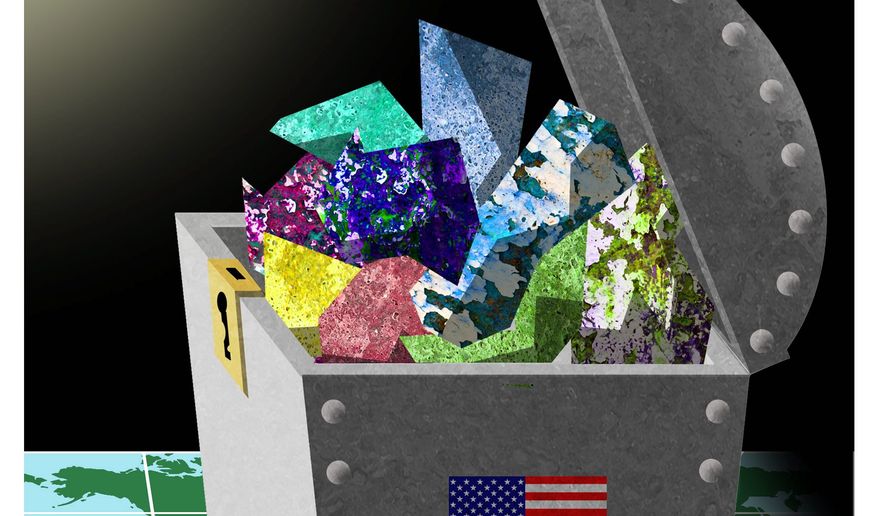OPINION:
Why is the United States reliant on China and Russia for strategic minerals when we arguably have more of these valuable resources than both these nations combined? This has nothing to do with geological impediments. It is all politics.
This is an under-reported scandal that jeopardizes American security. As recently as 1990 the U.S. was number one in the world in mining output. But according to the latest data from the U.S. Geological Survey, the U.S. is 100 percent import dependent for at least 20 critical and strategic minerals (not including each of the “rare earths”), and between 50 percent and 99 percent reliant for another group of 30 key minerals.
Why aren’t alarm bells ringing?
This import dependency has grown worse over the last decade. We now are totally dependent on imports for vital strategic metals that are necessary components for everything from military weapon systems, to cellphones, to solar panels to scores of new age high-technology products. We don’t even have a reliable reserve stockpile of these resources.
Fortunately, the Trump administration is working to reverse decades-long policies that have inhibited our ability to mine on federal and private lands our own abundant resources — mostly in the Western states like Montana, Colorado, Wyoming and the Dakotas.
In December the Trump administration issued a long-overdue policy directive, called “A Federal Strategy to Secure Reliable Supplies of Critical Minerals.” The goal is to open up federal lands, and streamline the permitting process so America can mine again.
Our mineral situation today is similar to our vulnerability to OPEC nations for oil and gas in the 1970s. Yet no nation on the planet is more richly endowed with an underground treasure chest of these resources than the U.S.
The U.S. Mining Association estimates more than $6 trillion in resources. We could be easily adding $50 billion of GDP every year through a smart mining policy. Mr. Trump wants to do for strategic domestic mineral production what his pro-drilling energy policy has done to vastly expand domestic supplies of oil, gas and coal.
Environmentalists are threatening lawsuits and throwing up other obstacles to this pro-economic development mineral policy — just as they oppose more open drilling in places like Alaska and off-shore. The stupidity of this antimining stance is that the green energy sources that they crave — solar and wind power — are dependent on rare metals to be viable.
Rare earth minerals are the seeds for building new technologies, and a strong case could be made that these strategic metals are the oil of the 21st century.
The suite of 15 primary minerals — which the U.S. has in abundance domestically — has been referred to as “the vitamins of chemistry.” They exhibit unique attributes like magnetism, stability at extreme temperatures and resistance to corrosion — properties that are key to today’s manufacturing.
These rare earth elements are essential for military and civilian use for the production of high-performance permanent magnets, GPS guidance systems, satellite imaging and night vision equipment, cellphones, iPads, flat screens, sunglasses, and a myriad of other technology products.
Thanks to years of a hands-off policy dictated by Washington, huge portions of public lands in the West have not been explored or mapped in nearly enough detail to satisfy the hunt for minerals. It takes 7 to 10 years to get mining permits here, versus 2 or 3 years in Australia and Canada. The nation must also map and explore again as was done in the Old West when mining for gold, copper, coal and other resources was common.
Mineral imports, particularly from China and Russia, are so out of control, they are providing enormous geopolitical leverage to these countries at precisely the wrong time in world events and American history. China, Russia and even some Third World dictators have used their mineral wealth to hold mineral importing countries hostage. Do we want Vladimir Putin to hold the commanding heights on strategic minerals?
The U.S. has already experienced gasoline lines and fuel price shocks. Will mineral embargoes be next that cripple our prosperity?
We need an overall change in strategy and psychology when it comes to mining. The 20th century philosophy of “lock up and preserve” needs to be replaced with an ethic of “use and explore” when it comes to federal land development.
We have hundreds of years of these resources with existing technology. We are not running out. Our world-class mineral deposits belong to the people, and are an American endowment that is here for our benefit.
Mr. Trump’s executive order supports both critical minerals development and good environmental stewardship. China’s leaders have been known to boast that: The Middle East has the oil and China has the rare earth minerals.
But that’s false. We do. With a pro-mining policy, we can and should make America a mineral exporting superpower, not an importer reliant on the supplies of countries that are our adversaries. This strategy has worked like a charm when it comes to energy, it should be employed to yield the same America First results for strategic minerals.
• Stephen Moore is a contributing editor to The Washington Times, a senior fellow at the Heritage Foundation and an economic consultant at Freedom Works. Ned Mamula is a geoscientist and adjunct scholar at the Center for the Study of Science at the Cato Institute.




Please read our comment policy before commenting.